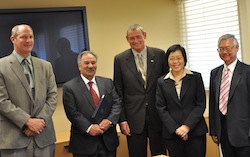A national laboratory in Thailand has signed an agreement that will allow them to produce biofuels using the University of California, Riverside’s process to convert biomass and agricultural wastes into fuel. The project is a collaboration between the UC Riverside Bourns College of Engineering and the Thailand Institute of Scientific and Technological Research. The work will focus on utilizing steam hydro gasification as a means to convert the biomass into fuel. This is a thermal chemical process that turns carbon-based materials into “drop-in” fuels such as gasoline, diesel and jet fuel.
“It’s really an exciting project because Thailand is showcasing the UCR technology,“ said Joseph Norbeck, a professor emeritus at UC Riverside. “It’s a showcase for all of Asia.”
 Norbeck, along with Dr. Chan Park and his students have led the development of steam hydro gasification at the College of Engineering Center for Environmental Research and Technology (CE-CERT). The steam hydro gasification process was recently determined by the U.S. Department of Energy to be the most efficient and least capital intensive of all gasification processes.
Norbeck, along with Dr. Chan Park and his students have led the development of steam hydro gasification at the College of Engineering Center for Environmental Research and Technology (CE-CERT). The steam hydro gasification process was recently determined by the U.S. Department of Energy to be the most efficient and least capital intensive of all gasification processes.
The duration of the partnership is currently set for three years and will allow an exchange of researchers to execute the research, an exchange of information and publications relating to the research, advice on related technology, implementation of cooperative research and joint publication of the research.
Norbeck has been working with researchers in Thailand for more than 15 years. The relationship has spawned several other collaborations between UC Riverside and Thai researchers including some work studying algae as a biofuel.
The agreement was signed on Monday with UC Riverside Chancellor Timothy P. White. Also present from Thailand were Sutiporn Chewasatn, deputy governor of Thailand Institute of Scientific and Technological Research and Chanchira Sinoulchan, foreign relations officer with the institute.
Reza Abbaschian, dean of the Bourns College of Engineering added, “It is critical to our mission that we be engaged with institutions and researchers throughout the world. Developing and sharing new knowledge across cultures and among nations ensures that we solve problems on a global as well as regional scale.”

